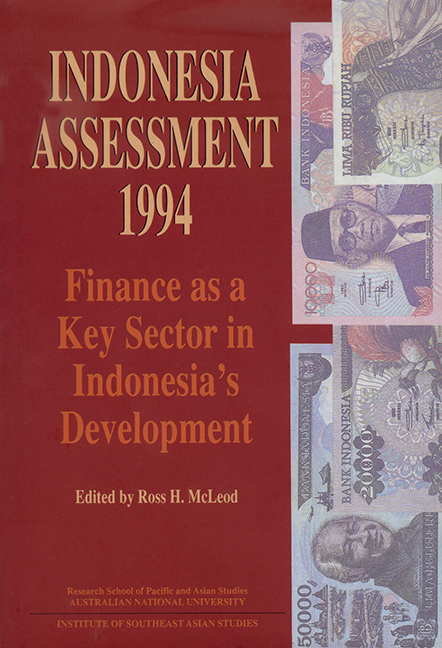Book contents
- Frontmatter
- Contents
- Tables, figures, appendices
- Foreword
- Glossary
- Contributors
- Acknowledgements
- 1 Introduction
- PART A ECONOMIC AND POLITICAL DEVELOPMENTS
- PART B FINANCE AS A KEY SECTOR IN INDONESIA'S DEVELOPMENT
- I The Reform Process
- II Monetary and Exchange Rate Policy
- III Banking Sector Reforms
- IV Domestic and International Capital Markets
- 12 The role of the Indonesian capital market
- 13 Indonesian capital market development and privatisation
- 14 Problems and prospects for the life insurance and pensions sector in Indonesia
- 15 Indonesia's foreign debt
- V Small-scale Finance
- References
- Index
12 - The role of the Indonesian capital market
from IV - Domestic and International Capital Markets
Published online by Cambridge University Press: 21 October 2015
- Frontmatter
- Contents
- Tables, figures, appendices
- Foreword
- Glossary
- Contributors
- Acknowledgements
- 1 Introduction
- PART A ECONOMIC AND POLITICAL DEVELOPMENTS
- PART B FINANCE AS A KEY SECTOR IN INDONESIA'S DEVELOPMENT
- I The Reform Process
- II Monetary and Exchange Rate Policy
- III Banking Sector Reforms
- IV Domestic and International Capital Markets
- 12 The role of the Indonesian capital market
- 13 Indonesian capital market development and privatisation
- 14 Problems and prospects for the life insurance and pensions sector in Indonesia
- 15 Indonesia's foreign debt
- V Small-scale Finance
- References
- Index
Summary
The history of the Indonesian capital market dates back to the period of Dutch colonisation. A stock exchange was established on December 14, 1912 in Batavia—or Jakarta, as the city is called today. It was considered sufficiently successful that two additional exchanges were set up in 1925—in Surabaya on January 11, and in Semarang on August 1. During this period, there were thirteen exchange members, and the number of listed securities totalled 250 (Usman 1990:186).
After the Proclamation of Independence in 1945, the Indonesian government attempted to re-activate the capital market through the issue of its own bonds in the 1950s. This activity was governed by the Emergency Law on the Bourse No. 13 of 1951, which was superseded by the Law on Bourse No. 15 of 1952 (Usman 1990:3). This law is still in effect, and governs the activities of all capital market practitioners, although a new law on capital markets is now being drafted, and is expected to be introduced to the Parliament before the end of the fiscal year in March, 1995 (Ruru 1994b). According to Article 3 of the existing law, the Minister of Finance is responsible for supervising the activities of the Jakarta Stock Exchange (JSX), while Article 5 delegates responsibility for organising its activities from the Minister to the Association of Money and Securities Traders (Perserikatan Perdagangan Uang dan Efek-Efek, or PPUE), with the assistance of the central bank (Bank Indonesia).
A sluggish revival: 1977-1988
After independence, the law and the association proved unable successfully to promote the further development of the capital market, which fell into decline—for reasons which included the nationalisation of Dutch and other foreign companies, political instability, and chaotic economic conditions in which inflation peaked at 650 per cent in the mid-1960s. In an attempt to revive the Jakarta Stock Exchange, the New Order government set up a Capital Market Executive Agency (Badan Pelaksana Pasar Modal, Bapepam) through a Presidential Decree (Government of Indonesia, 1976). Bapepam was established as a unit within the Ministry of Finance, with a mandate to organise the stock exchange and to act as the capital market supervisory agency.
- Type
- Chapter
- Information
- Indonesia Assessment 1994Finance as a Key Sector in Indonesia's Development, pp. 202 - 222Publisher: ISEAS–Yusof Ishak InstitutePrint publication year: 1994

